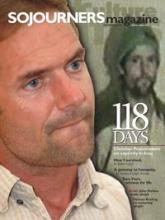Jesus Christ—who, as it turns out, was born of a virgin, cheated death, and rose bodily into the heavens—can now be eaten in the form of a cracker. A few Latin words spoken over your favorite burgundy, and you can drink his blood as well. Is there any doubt that a lone subscriber to these beliefs would be considered mad? Rather, is there any doubt that he would be mad? The danger of religious faith is that it allows otherwise normal human beings to reap the fruits of madness and consider them holy.
My beloved book club, not to be confused with a Christian gathering, was reading The End of Faith, by Sam Harris, during Holy Week as it turned out. I cited the above quote as proof when several in my group protested my description of Harris as somewhat harsh. It was then that one of my friends asked, “But you don’t believe that about Communion anyway, do you? That it is really a body and blood? You couldn’t. How could anyone? So that wouldn’t offend you personally, would it?”
I answered awkwardly, honestly, as true friends really grappling with these things from different worldviews and religious beliefs do. And I continue to consider these questions more since my experience at the Liberian Communion table at Monrovia United Methodist Church in April 2006.
I visited the church as a guest of Liberia’s new president, Ellen Johnson-Sirleaf, the first female African head of state. I was in the country as part of a team led by former Ambassador Swanee Hunt, whom Johnson-Sirleaf had asked to provide training for the newly elected parliament, government ministers, and civil society members.
Liberia is just emerging from two civil wars over the course of 14 years. It is a small country of 3 million, rich in natural resources but devastated by war. About a quarter of the remaining population is under the age of 14, and the unemployment rate is 85 percent.
Read the Full Article
